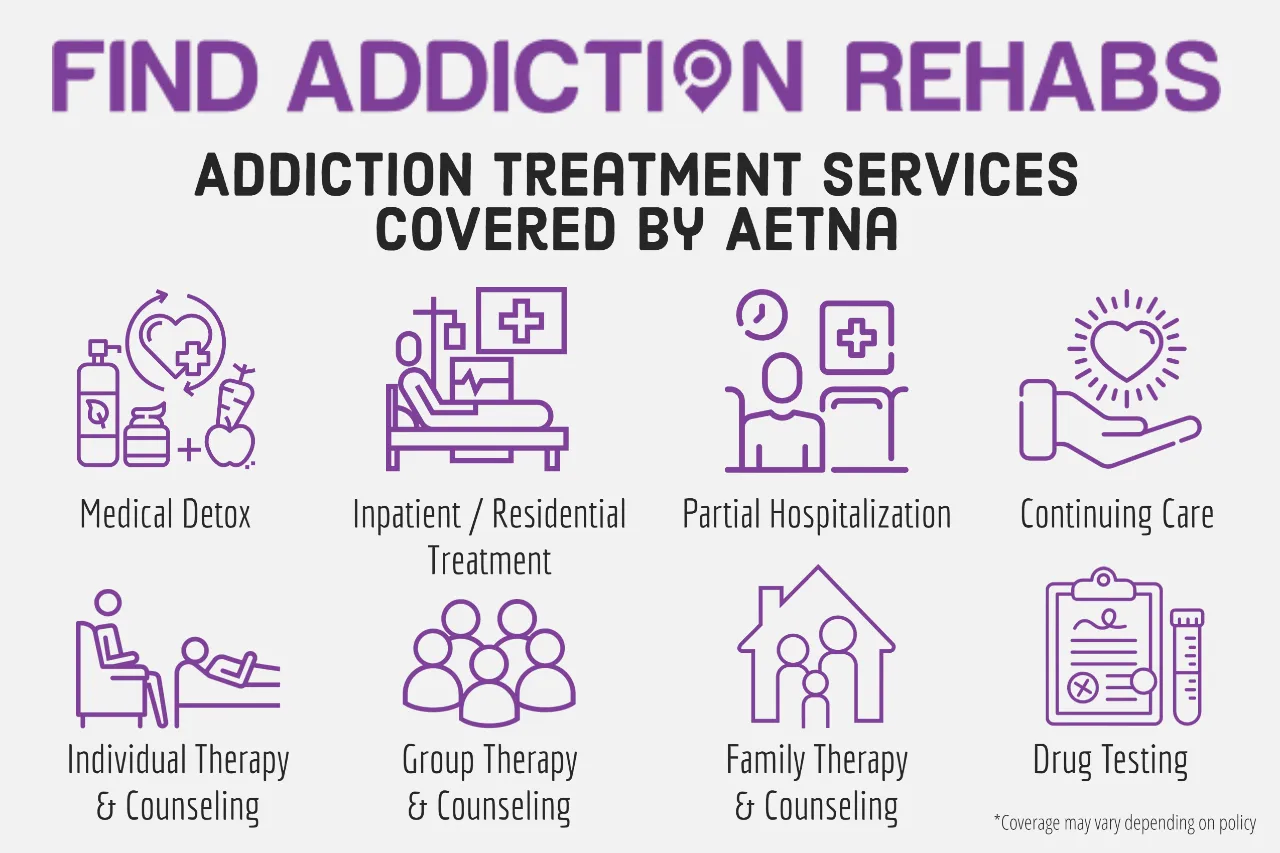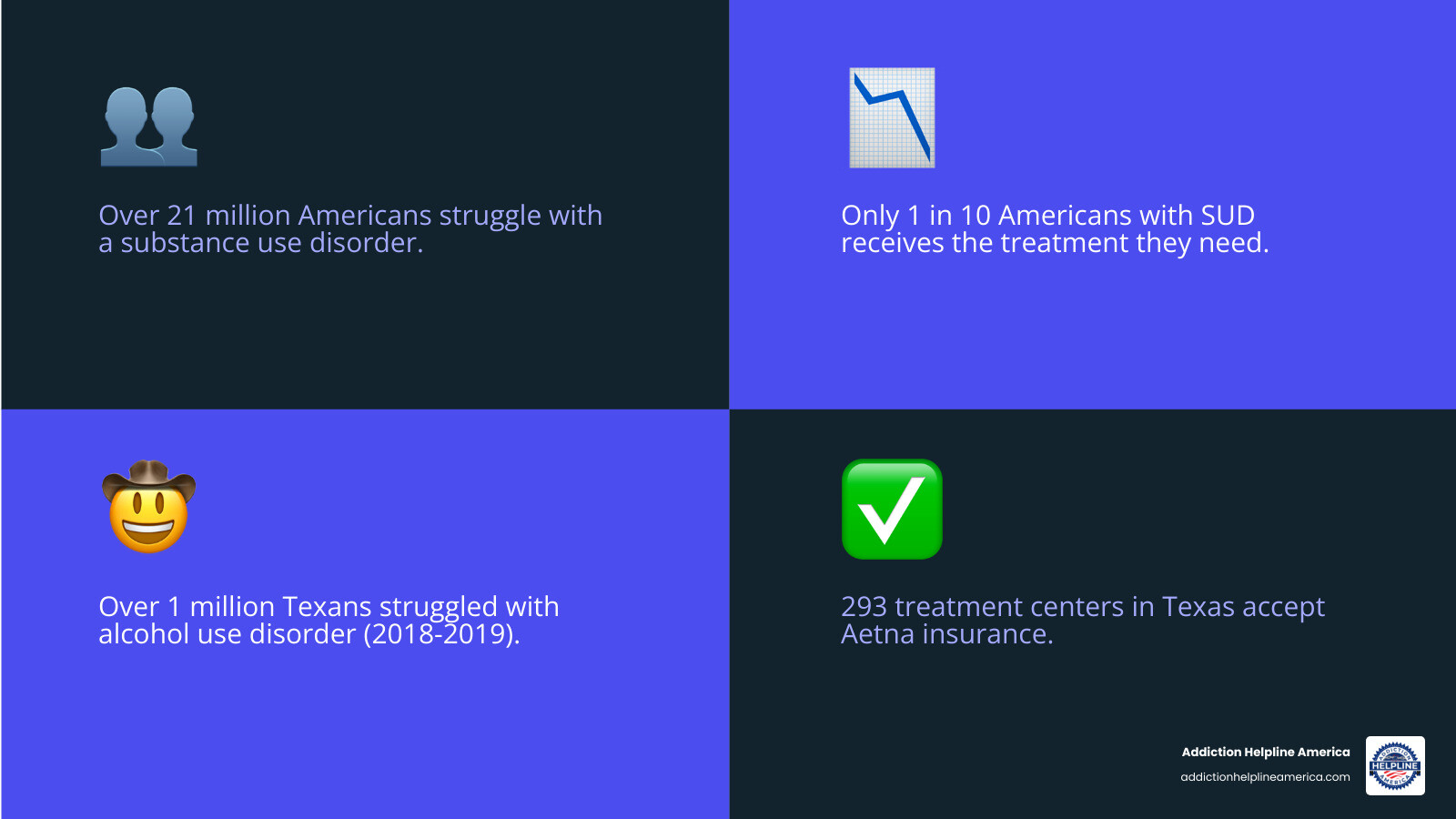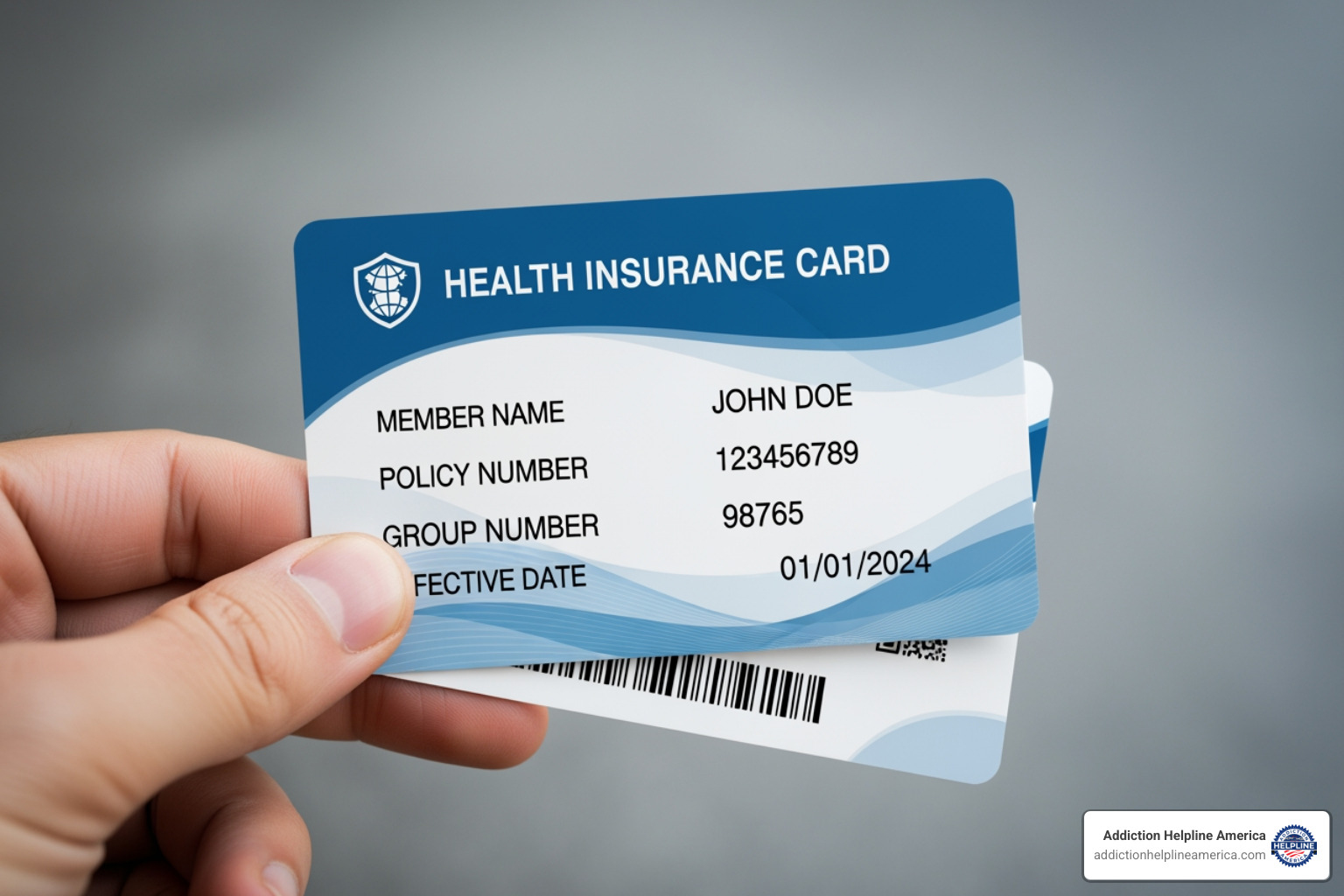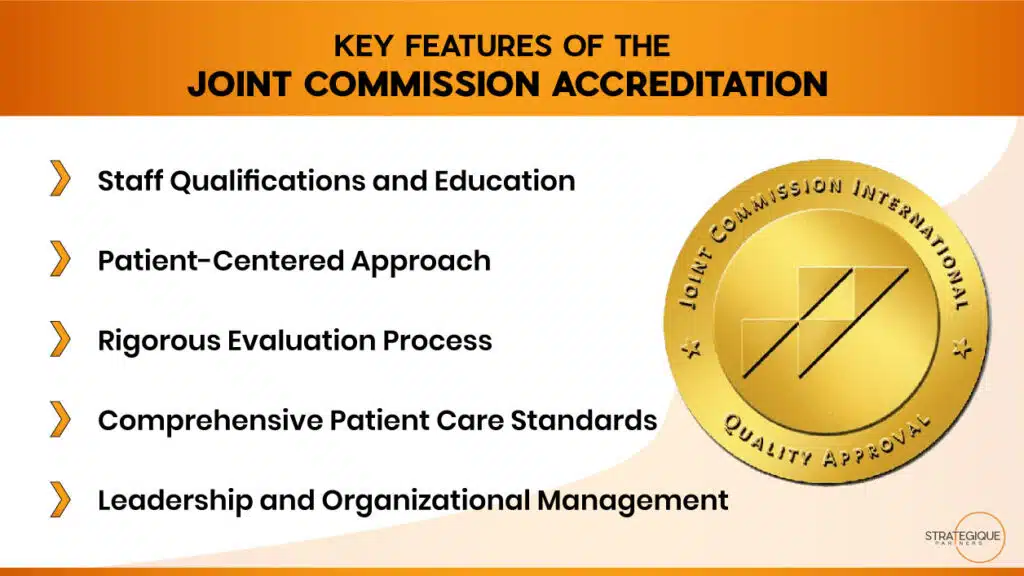
Finding Quality Alcohol Treatment That Works With Your Insurance
Alcohol treatment centers that accept aetna provide crucial access to recovery for millions of Americans. If you or a loved one is struggling with alcohol use disorder, your Aetna insurance can make professional treatment affordable.
Quick Answer: Does Aetna Cover Alcohol Treatment?
- Yes, Aetna covers alcohol rehab. The Affordable Care Act (ACA) mandates this coverage as an essential health benefit.
- What’s Covered: Medical detox, inpatient/residential rehab, and various outpatient programs (PHP, IOP).
- Coverage Varies: Your out-of-pocket costs depend on your specific plan (HMO, PPO, etc.).
- Verify Your Benefits: Always confirm your coverage with Aetna or a treatment center before starting.
While millions of Americans have a substance use disorder, only a fraction get help. Finding the right treatment center means looking beyond insurance acceptance to find a facility with evidence-based care, medical detox, and a full continuum of support.
Navigating Aetna’s different plans, networks, and costs can be overwhelming. At Addiction Helpline America, we specialize in helping people understand their insurance for addiction treatment. We can quickly and confidentially connect you with alcohol treatment centers that accept aetna nationwide, simplifying the process so you can focus on recovery.

Understanding Your Aetna Coverage for Alcohol Rehab
As one of the nation’s largest insurers, Aetna provides health benefits to millions of Americans. The Affordable Care Act (ACA) transformed insurance coverage for addiction by classifying substance use disorder treatment as one of 10 essential health benefits. This means every Aetna plan must provide some level of coverage for alcohol rehab.
The ACA also reinforces the Mental Health Parity and Addiction Equity Act, ensuring that coverage for addiction treatment is no more restrictive than coverage for physical health issues. For more details on these protections, you can visit Health benefits & coverage: mental health & substance abuse coverage.
While coverage is guaranteed, the specifics depend on your individual plan. Understanding these details is key to managing your costs.

What Types of Treatment Does Aetna Cover?
Aetna typically covers a full range of services based on the ASAM (American Society of Addiction Medicine) levels of care, ensuring you get the right support at the right time.
- Medical Detoxification: Medically supervised withdrawal management to safely and comfortably overcome physical dependence on alcohol. This is a critical first step, as alcohol withdrawal can be dangerous.
- Inpatient/Residential Rehabilitation: Live-in treatment providing 24/7 care and intensive therapy in a structured, trigger-free environment.
- Partial Hospitalization Programs (PHPs): A step-down from inpatient care, offering structured day treatment for several hours a day, five days a week, while you return home at night.
- Intensive Outpatient Programs (IOPs): Flexible yet structured care with several hours of therapy multiple days a week, allowing you to maintain work or family commitments.
- Continuing Care: Ongoing therapy, support groups, and alumni programs to help you maintain long-term sobriety.
To learn more about these approaches, our page on treatment options has additional information.
How Aetna Plans Affect Your Coverage and Costs
Your out-of-pocket costs are determined by your plan type and a few key terms:
- Plan Types: HMO plans offer lower premiums but require you to stay in-network and get referrals. PPO plans provide more flexibility to see out-of-network providers, but at a higher cost. High-Deductible Health Plans (HDHPs) have lower premiums but require you to pay more upfront before coverage begins.
- Key Financial Terms: Your deductible is the amount you pay before insurance starts paying. A copayment is a fixed fee for a service. Coinsurance is the percentage of costs you pay after meeting your deductible. Your out-of-pocket maximum is the most you’ll pay in a year.
- In-Network vs. Out-of-Network: This is the most critical factor. In-network facilities have pre-negotiated rates with Aetna, resulting in significantly lower costs for you. Out-of-network care is always more expensive and may not be covered at all by some plans.
To understand your specific costs, log into the member website or call the number on your insurance card.
Does Aetna Cover Co-Occurring Disorders?
Yes, and this is vital. Aetna plans cover dual diagnosis treatment, which addresses both a substance use disorder and a co-occurring mental health condition like depression, anxiety, or PTSD.
Alcohol use disorder rarely exists in a vacuum. Treating the addiction without addressing the underlying mental health issue (or vice versa) often leads to relapse. Integrated treatment, where psychiatrists and therapists address both conditions simultaneously, is the most effective approach.
Because the ACA mandates coverage for mental and behavioral health, Aetna is required to cover this comprehensive care. If you’re struggling with both, our Rehabs for Depression Guide 2025 offers more insight.
How to Verify Your Aetna Benefits for Alcohol Treatment
Before starting treatment, it’s empowering to verify your Aetna benefits to avoid financial surprises and focus on recovery. You may encounter terms like pre-authorization (Aetna’s approval before treatment begins) and medical necessity (the requirement that treatment is essential for your diagnosis). A quality treatment provider will help you steer this process.
Most alcohol treatment centers that accept aetna have admissions staff who can verify your benefits for you, but you can also do it yourself.

Steps to Confirm Your Coverage
Here are the most effective ways to get clarity on your Aetna benefits:
- Call Aetna Directly: The member services number on your insurance card is your direct line to a representative who can explain your benefits.
- Use the Aetna Member Portal: Log into your account online to view plan details, track your deductible, and search for in-network providers.
- Speak with a Rehab Admissions Navigator: This is often the easiest path. The admissions team at a treatment center can verify your benefits and explain your specific costs at their facility. At Addiction Helpline America, our navigators provide this service for free.
- Review Your Plan Documents: Your Summary of Benefits and Coverage provides a general overview of what your plan covers.
Our Resources Does Insurance Cover Rehab page offers more general information on this topic.
Information to Have Ready
To speed up the verification process, have the following information available:
- Your full name and date of birth
- Your Aetna insurance policy number and group number (from your card)
- The name and date of birth of the primary subscriber (if it’s not you)
- The name and location of the treatment facility you are considering
What to Look for in the Best Alcohol Treatment Centers That Accept Aetna
Finding a facility that accepts your insurance is the first step. The next is ensuring it provides high-quality, effective care. When evaluating alcohol treatment centers that accept aetna, look for these key features that define a top-tier program and will give you the best chance at lasting recovery.
1. Comprehensive Medical Detoxification
Alcohol withdrawal can be dangerous and even life-threatening, with risks including seizures and delirium tremens (DTs). This is why medically-supervised withdrawal is a non-negotiable feature of any quality alcohol treatment program. The best alcohol treatment centers that accept aetna make medical detox a cornerstone of their care.
During medical detox, you receive 24/7 medical care from doctors and nurses who monitor your vital signs and manage withdrawal symptoms. They can administer FDA-approved medications to ease discomfort from symptoms like nausea, anxiety, and insomnia, ensuring your safety and comfort.
Detox is not a cure, but the essential first step that stabilizes you physically so you can begin the psychological work of recovery. Aetna recognizes this as a medical necessity and covers it under most plans. For more on medication-assisted approaches, our Methadone Programs Near Me Guide provides related information, though it focuses on opioid use.
2. Specialized Dual Diagnosis Programs
Alcohol use disorder often co-occurs with mental health conditions like depression, anxiety, or PTSD. Many people use alcohol to self-medicate these underlying issues. The most effective alcohol treatment centers that accept aetna offer dual diagnosis programs to treat both conditions simultaneously.
An integrated treatment approach is key. This means that on-site psychiatrists, psychologists, and therapists collaborate on a unified plan. Simply stopping drinking won’t resolve untreated anxiety; true healing requires addressing the root causes of both the addiction and the mental health condition.
By weaving therapy for mental health conditions into the addiction treatment process, these programs give you a much stronger foundation for lasting recovery. You learn not just how to stop drinking, but how to heal the issues that drove the drinking in the first place. Our Mental Breakdown Treatment Complete Guide offers more insights into finding comprehensive mental health support.
3. A Full Continuum of Care
Recovery is a journey, not a single event. The best alcohol treatment centers that accept aetna provide a full continuum of care, allowing you to seamlessly transition through different levels of support as you grow stronger in your sobriety.
This step-down process typically follows the evidence-based ASAM (American Society of Addiction Medicine) levels of care and may include:
- Medical Detox and Inpatient/Residential Treatment for initial stabilization and intensive care.
- Partial Hospitalization (PHP) and Intensive Outpatient (IOP) programs that provide robust support while you begin reintegrating into daily life.
- Standard Outpatient Care and Aftercare Planning to provide long-term support and prevent relapse.
This gradual transition is clinically proven to improve long-term outcomes by allowing you to practice new skills in real-world settings with a professional safety net. A facility’s commitment to long-term recovery support is a sign of a quality program. You can learn more about these clinical guidelines by reading About the ASAM criteria.
4. Top-Tier Accreditations and Licensing
Accreditations and licensing are your assurance that a treatment facility meets high standards for safety, quality, and ethical care. When researching alcohol treatment centers that accept aetna, look for these credentials as proof of their commitment to excellence.
- The Joint Commission (JCAHO): This accreditation is the gold standard in healthcare. The Gold Seal of Approval indicates a facility has undergone rigorous evaluation of its clinical practices and safety protocols.
- CARF (Commission on Accreditation of Rehabilitation Facilities): CARF accreditation signifies a focus on person-centered care and continuous quality improvement in rehabilitation services.
- State Licensing: This is a mandatory requirement. A facility must be licensed by its state to operate legally, ensuring it meets basic safety and staffing standards.
- Staff Credentials: Look for a team of licensed and certified professionals, including board-certified physicians, psychiatrists, and addiction counselors.
Addiction Helpline America partners only with facilities that are properly licensed and, ideally, hold accreditations from respected bodies like JCAHO or CARF.

5. Evidence-Based Therapeutic Approaches
Effective treatment relies on therapeutic methods that are scientifically proven to work. The best alcohol treatment centers that accept aetna use a variety of evidence-based approaches to address the complex nature of addiction.
Key therapies include:
- Cognitive Behavioral Therapy (CBT): Helps you identify and change negative thought patterns and behaviors related to drinking.
- Dialectical Behavior Therapy (DBT): Teaches skills for managing intense emotions, tolerating distress, and improving relationships.
- Individual Therapy: Provides a private setting to work one-on-one with a therapist on personal issues and root causes of addiction.
- Group Therapy: Offers peer support and a sense of community, reducing feelings of isolation.
- Family Counseling: Works to heal relationships, improve communication, and build a supportive home environment for recovery.
Many centers also integrate 12-Step programs like Alcoholics Anonymous, which provide a powerful framework for long-term support. Our 12 Step of AA page offers more detail on this approach. A combination of these therapies provides the most comprehensive care.
6. Finding Texas-based alcohol treatment centers that accept Aetna
If you’re in Texas, help is close by. With over a million Texans facing alcohol use disorder, the need for accessible care is significant. The good news is there are 293 alcohol treatment centers that accept aetna across the state.
Choosing a local Texas facility offers several advantages, including proximity to your local support systems (family and friends) and easier access to aftercare resources like therapy and support groups upon completion of your program.
However, an out-of-state treatment option can also be beneficial, providing a complete change of scenery away from triggers and old habits. The right choice depends entirely on your individual needs.
At Addiction Helpline America, our network includes quality facilities throughout Texas and across all 50 states. Whether you’re in a major city like Dallas or a smaller community, we can connect you with a program that fits your needs. From urban centers to serene rural settings, we help you find the right environment for your recovery. Our Best Drug Rehab Centers Lubbock guide, for example, provides insight into regional options.
7. Personalized Aftercare and Relapse Prevention Planning
Recovery is a long-term process that extends far beyond the walls of a treatment center. The best alcohol treatment centers that accept aetna understand this and make personalized aftercare and relapse prevention a core part of their program from day one.
A strong aftercare plan is your roadmap for maintaining sobriety. It should begin with discharge planning early in your treatment and include a strategy for your transition back to daily life. Key components of a comprehensive aftercare plan include:
- Sober Living Arrangements: Structured, substance-free housing that provides a supportive environment to practice recovery skills before returning home. Our Sober Living Tulsa Guide explains how these homes support recovery.
- Alumni Programs: A way to stay connected to the treatment facility and a community of peers who share your recovery journey.
- Support Groups: Ongoing participation in groups like Alcoholics Anonymous (AA) or SMART Recovery provides crucial fellowship and accountability.
- Ongoing Therapy Coordination: Continuing with individual, group, or family therapy ensures you maintain therapeutic momentum.
Aetna’s coverage often extends to these continuing care services, supporting your long-term success.
Frequently Asked Questions about Aetna and Alcohol Rehab
Navigating insurance can be confusing. Here are concise answers to some of the most common questions about using Aetna for alcohol treatment.
Does Aetna cover alcohol rehab in Texas?
Yes. The Affordable Care Act (ACA) mandates that all Aetna plans cover substance use disorder treatment as an essential health benefit. There are 293 treatment centers in Texas that accept Aetna, giving you numerous options. Your costs will be lowest if you choose an in-network facility.
What specific alcohol-related services does Aetna typically cover?
Aetna’s coverage is comprehensive and typically includes the full spectrum of care when deemed medically necessary:
- Detoxification
- Inpatient and residential treatment
- Partial Hospitalization (PHP) and Intensive Outpatient (IOP) programs
- Individual, group, and family therapy
- Medication-assisted treatment (MAT)
- Aftercare programs
How much will I have to pay for rehab with Aetna insurance?
Your exact cost depends on your specific plan. Key factors include your deductible, copayments, coinsurance, and out-of-pocket maximum. The most significant factor is whether you choose an in-network or out-of-network provider; staying in-network will always be more affordable.
Don’t guess your costs. The best way to get a clear answer is to verify your benefits. You can call Aetna, use the member portal, or let the admissions team at a treatment center do it for you. At Addiction Helpline America, we offer free, confidential benefits verification to eliminate the stress and uncertainty.
Conclusion: Your Path to Recovery Starts Now
Deciding to seek help for alcohol use disorder is a courageous first step. With your Aetna insurance, high-quality treatment is within your reach. As this guide has shown, the ACA ensures your plan covers essential services like detox, inpatient care, and dual diagnosis treatment.
While insurance details can seem complex, verifying your benefits is a straightforward process that empowers you to move forward with confidence. Remember to look for alcohol treatment centers that accept aetna and also demonstrate true quality through accreditations, evidence-based therapies, and a commitment to aftercare.
At Addiction Helpline America, we are dedicated to making this journey simpler. Our free, confidential service connects you to the right treatment program from our vetted network of facilities across the country. We eliminate the guesswork so you can focus on what matters most: your recovery.
Your recovery is possible, and it can start today. Let us help you take the next step.
Find the right Aetna-accepting rehab for you
Our helpline is 100%
free & confidential
If you or someone you care about is struggling with drug or alcohol addiction, we can help you explore your recovery options. Don’t face this challenge alone—seek support from us.
Programs
Resources
Will my insurance
cover addiction
treatment?
We're ready to help
Find the best
drug or alcohol treatment
center
Are you or a loved one struggling with addiction? Call today to speak to a treatment expert.












